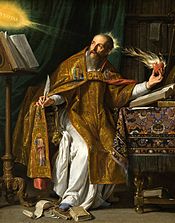| Part of a series on |
| Augustinianism |
|---|
 |
|
|
Augustinian soteriology refers to Augustine of Hippo (354–430) view on human salvation and God's providence. His thinking was shaped by early encounters with Stoicism, Neoplatonism, and Manichaeism. Although initially opposing deterministic ideas, Augustine later incorporated elements of these philosophies, especially in his debates with the Pelagians. His doctrines, such as predestination by predeterminism, became foundational for later theological developments and had a lasting impact on Christian thought up to the Reformation. Augustine's influence on John Calvin (1509–1564) was particularly significant in shaping Calvinist soteriology and its understanding of divine providence.